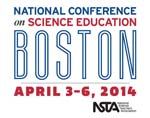“Leading From the Classroom”: Featured Strand at NSTA’s 2014 National Conference on Science Education in Boston, MA, April 3–6
By Lauren Jonas, NSTA Assistant Executive Director
Posted on 2014-01-25
 This April, the National Science Teachers Association (NSTA) will feature a special strand “Leading From the Classroom” at our 2014 National Conference on Science Education, in Boston, April 3–6.
This April, the National Science Teachers Association (NSTA) will feature a special strand “Leading From the Classroom” at our 2014 National Conference on Science Education, in Boston, April 3–6.
Can you be a classroom teacher and a leader? Yes! You grow professionally throughout your career, and as you do, you see opportunities to improve science education. If you’re like other great science teachers, you may think your only career path leads out of the classroom. But as seasoned NSTA members know, there are many ways you can take on a leadership role while doing what you love–teaching science in the classroom. This strand addresses the skills and opportunities for developing your leadership capacity while continuing to serve as an effective classroom teacher.
Sessions organized around this strand include a featured presentation on Friday, April 4, 8:00–9:00 AM (“The NRC Framework and the NGSS: An Opportunity for Teacher Growth and Leadership”) by Arthur Eisenkraft (Distinguished Professor of Science Education, Professor of Physics, and Director of the Center of Science and Math in Context, UMass: Boston, MA). More sessions on Leading From the Classroom include the following:
- Preparing for the Future: Developing Science Teacher Leaders
- Opening Up Your Door: Fostering Teacher-led Communities of Inquiry and Collaboration
- Becoming Teacher Leaders Through Curriculum Development: Collaborating to Design and Implement the Science Youth Action Research Curriculum
- Teachers and STEM Education Policy
- Building Teacher Capacity: The Role of Science Leader-Teachers
- Science Education Fellowship Program: Supporting District Cohorts of Science Teacher Leaders
- How to Effectively Implement a Curricular Review as a Teacher Leader
- Teachers Developing as Leaders: A Panel Discussion
- Analyzing Student Work for Language Structures That Support Conceptual Understanding
- Teacher Leaders in the RESTEP to STEM
- Developing Teachers into Master Educators and Leaders: National Board Certification
- Who Me? Yes, YOU! How to Become a Teacher Leader
- Making the Case for Elementary Science Specialists
- Professional Development: Capturing the Trends, Practices, and Research to Strengthen Teaching and Learning
- Partners in Learning and Leading: Teacher Residencies in a Science Museum
- To Lead from the Classroom, Get Out of the Classroom!
- Streamline to Mastery: A Model for STEM Professional Development
- SILT (Science Instructional Leadership Teams): A Model of Student Work Analysis to Improve Teacher Practice
- Levels of Leadership for Teachers in Educator-based Organizations: An Example from the Pennsylvania Earth Science Teachers Association
- Collaborative Capacity Building for Next Generation Science Teacher-Leaders
Want more? Check out more sessions and other events with the Boston Session Browser/Personal Scheduler.
Disclaimer: The views expressed in this blog post are those of the author(s) and do not necessarily reflect the official position of the National Science Teaching Association (NSTA).


